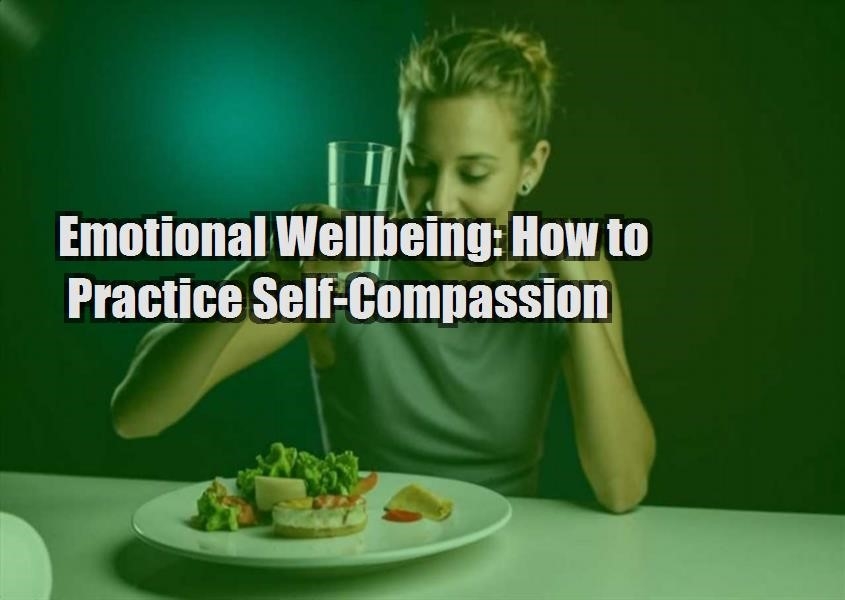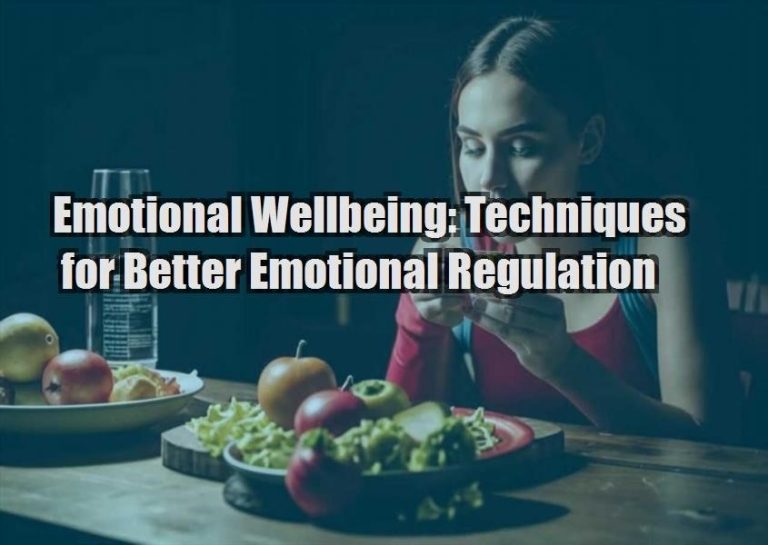In todays fast-paced world, emotional wellbeing is more important than ever. As we navigate through lifes challenges, its easy to become overwhelmed and critical of ourselves. This is where self-compassion comes into play. Practicing self-compassion can significantly enhance your emotional wellbeing, leading to a healthier, more balanced life. In this article, we will explore the concept of self-compassion and provide practical tips on how to integrate it into your daily routine.
Understanding Emotional Wellbeing
Emotional wellbeing refers to the overall state of your emotions and how you manage them. It encompasses your ability to cope with stress, maintain healthy relationships, and experience positive emotions. A high level of emotional wellbeing is associated with improved physical health, better relationships, and increased life satisfaction.
The Importance of Emotional Wellbeing
Maintaining emotional wellbeing is crucial because it directly impacts every aspect of your life. People with high emotional wellbeing tend to have stronger immune systems, lower levels of stress, and are generally more resilient in the face of adversity. Furthermore, they often have more fulfilling relationships and greater professional success.
What is Self-Compassion?
Self-compassion involves treating yourself with the same kindness and understanding as you would treat a close friend. It means recognizing your own suffering and responding with care and concern. Self-compassion has three main components:
- Self-kindness: Being warm and understanding toward yourself during difficult times, rather than being overly critical or harsh.
- Common humanity: Recognizing that suffering and imperfection are part of the shared human experience, rather than feeling isolated by your struggles.
- Mindfulness: Being aware of your thoughts and feelings without judgment, allowing yourself to experience them without being overwhelmed.
The Benefits of Practicing Self-Compassion
Practicing self-compassion has numerous benefits for your emotional wellbeing. It can help reduce stress, anxiety, and depression while promoting a positive mindset and emotional resilience. When you are compassionate towards yourself, you are more likely to bounce back from setbacks and approach lifes challenges with a more balanced and optimistic outlook.
Improved Mental Health
Research has shown that self-compassion is linked to lower levels of anxiety and depression. By treating yourself with kindness and understanding, you can reduce the negative self-talk that often contributes to these conditions.
Increased Resilience
Self-compassion helps build resilience by fostering a more positive and supportive inner dialogue. When faced with difficulties, self-compassionate individuals are better equipped to handle stress and recover more quickly from setbacks.
Enhanced Relationships
Practicing self-compassion can also improve your relationships with others. When you are kind and understanding toward yourself, you are more likely to extend that same compassion to those around you, leading to healthier and more fulfilling relationships.
How to Practice Self-Compassion
Incorporating self-compassion into your daily life requires practice and patience. Here are some practical tips to help you get started:
1. Practice Mindfulness
Mindfulness involves being present in the moment and observing your thoughts and feelings without judgment. This awareness allows you to recognize when you are being self-critical and to respond with compassion instead. Try incorporating mindfulness practices such as meditation, deep breathing, or mindful walking into your daily routine.
2. Challenge Negative Self-Talk
Pay attention to your inner dialogue and notice when you are being overly critical of yourself. Challenge these negative thoughts by asking yourself if you would say the same things to a friend in a similar situation. Replace harsh self-criticism with supportive and understanding language.
3. Treat Yourself with Kindness
Make a conscious effort to treat yourself with the same kindness and care that you would offer to a loved one. This might involve taking time for self-care activities, giving yourself permission to rest, or speaking to yourself in a gentle and encouraging manner.
4. Recognize Your Common Humanity
Remind yourself that everyone makes mistakes and experiences difficulties. You are not alone in your struggles. Understanding that suffering is a part of the human experience can help you feel more connected to others and less isolated by your challenges.
5. Practice Self-Compassionate Phrases
Develop a set of self-compassionate phrases that you can use when you are feeling down or critical of yourself. Examples include: I am doing my best, Its okay to make mistakes, and I am worthy of love and compassion. Repeat these phrases to yourself whenever you need a boost of self-compassion.6. Keep a Self-Compassion Journal
Maintaining a self-compassion journal can be a powerful tool for building self-awareness and fostering self-compassion. Each day, write down moments when you felt self-critical or stressed, and then reframe these experiences with self-compassionate responses. Over time, this practice can help you develop a more compassionate mindset.
7. Engage in Self-Care Activities
Engaging in activities that nurture your body, mind, and spirit is an essential aspect of self-compassion. Prioritize activities that bring you joy and relaxation, such as reading, exercising, spending time in nature, or engaging in creative hobbies. Self-care is not a luxury but a necessity for maintaining emotional wellbeing.
8. Seek Professional Support
If you find it challenging to practice self-compassion on your own, consider seeking support from a therapist or counselor. Professional guidance can provide you with personalized strategies and support to help you cultivate self-compassion and improve your emotional wellbeing.
Overcoming Barriers to Self-Compassion
While practicing self-compassion is beneficial, it is not always easy. Many people face barriers that can make it difficult to be kind to themselves. Here are some common obstacles and tips on how to overcome them:
Fear of Self-Indulgence
Some people worry that self-compassion will lead to self-indulgence or laziness. However, self-compassion is about acknowledging your struggles and treating yourself with kindness, not giving yourself a free pass to avoid responsibilities. Remember that self-compassion can motivate you to take better care of yourself and pursue your goals with greater resilience.
Difficulty Letting Go of Self-Criticism
Many individuals have been conditioned to believe that self-criticism is necessary for self-improvement. However, research shows that self-compassion is a more effective motivator than self-criticism. To let go of self-criticism, practice recognizing your achievements and progress, no matter how small, and celebrate your efforts rather than focusing solely on outcomes.
Feeling Undeserving of Compassion
Some people struggle with feelings of unworthiness and believe they do not deserve compassion. It is important to challenge these beliefs and recognize that everyone, including yourself, deserves kindness and understanding. Reflect on your inherent worth and the value you bring to the world.
Conclusion
Emotional wellbeing is a vital aspect of a fulfilling and balanced life. Practicing self-compassion is a powerful way to enhance your emotional wellbeing by fostering kindness, understanding, and resilience. By incorporating self-compassionate practices into your daily routine, you can cultivate a healthier relationship with yourself and navigate lifes challenges with greater ease. Remember, self-compassion is a journey, and every step you take towards being kinder to yourself is a step towards a happier, more emotionally balanced life.
Start today by embracing self-compassion and experience the transformative impact it can have on your emotional wellbeing. Be gentle with yourself, recognize your shared humanity, and practice mindfulness. Your journey to emotional wellbeing begins with self-compassion.







